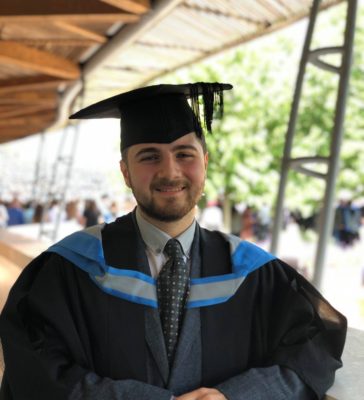
Constantinos Christou
Current Employer/Organisation Name
UK Civil Service
What have you been doing since leaving Exeter, and what are you doing now?
After graduating from my BSc Politics and International Relations degree from Exeter, I did a two-year grad scheme in Client Services at the market research company Kantar. I specialised in research design, and worked on a variety of projects, including those on sustainability and diversity and inclusion. After developing an interest in user-centred design, I decided to move into public sector technology by accepting a role on the Civil Service Fast Stream. I’m currently in my first posting as a Deliver Manager in the Department for International Trade, working on a project to deliver a Tariff Application Product – hosting the UK’s post-Brexit trade tariffs.
Why did you choose this career? And what do you enjoy most about your work?
I chose this career path because I enjoy building and improving digital services to make them more efficient and user-friendly. I dabbled in this during my time in the private sector, and ultimately realised that I’d rather serve members of the public without the motive of trying to sell them products for the sake of profit.
Please tell us if you were a member of any societies, groups or sports clubs?
At Exeter, I was a member of several societies, namely the Debating Society and Arabic and Middle East society. I was also the President of the upReach society, which promoted social mobility causes and resources on campus via upReach, a charity with whom the university is partnered. I was also a student ambassador and Q-Step peer leader.
Were you part of the Exeter Student Ambassador Scheme at any point during your studies?
Yes.
What did you enjoy most about your programme and what was the biggest highlight?
My biggest highlight was the opportunity to learn how to code and integrate data analytics into my projects, enabling me to add a quantitative element to my reports and essays. With this came the opportunity to work for the Q-Step centre to enhance my coding skills and help other students with their coursework.
What did you enjoy most about studying here?
The campus had a great feel to it; having spent my education in under-funded state schools, it felt good to finally have the resources I needed to fully elevate my studies, and it allowed me to thrive academically. For example, as a research assistant with the Q-Step centre, I was flown out to Amsterdam as part of a research project and collaborated with academics from France and the Netherlands. I was also fortunate to undertake three paid internships during my time at Exeter, two of which I discovered thanks to my department.
Why did you choose to study at Exeter?
It had my favourite politics course in the country, and offered the flexibility to specialise in modules on public opinion and immigration policy, whilst also developing hard coding and data analysis skills. As a Londoner, I was also attracted to the scenery and the landscape, which was an added bonus to my time at Exeter.
What skills and experiences have been most useful for your career?
The confidence to generate and interpret numbers was instrumental in turning me towards my current career path. There is a well-documented skills gap in the UK, particularly in the public sector, regarding tech and digital skills, so being able to learn these skills in a supportive environment during my social sciences degree was invaluable.
What advice would you give to a current student who wishes to pursue your career?
Take advantage of opportunities you come by that interest you. University is the optimal time for you to learn new things, so why do the minimum to pass when you can go the extra mile? Don’t be tentative and let things pass you by only to regret them later. Specifically, try and find work experience as soon as possible in a field you’re curious about, because it led to some very unexpected and fantastic opportunities that I cherish now that I’m in full-time employment.
What are your plans for the future?
I intend on progressing off the Fast Stream and onto a user-centred design role on a team developing a government digital service. Beyond that, the Civil Service is very supportive of career breaks, so I would like to take a year out to do a Masters in Migration Studies or Digital Anthropology.

